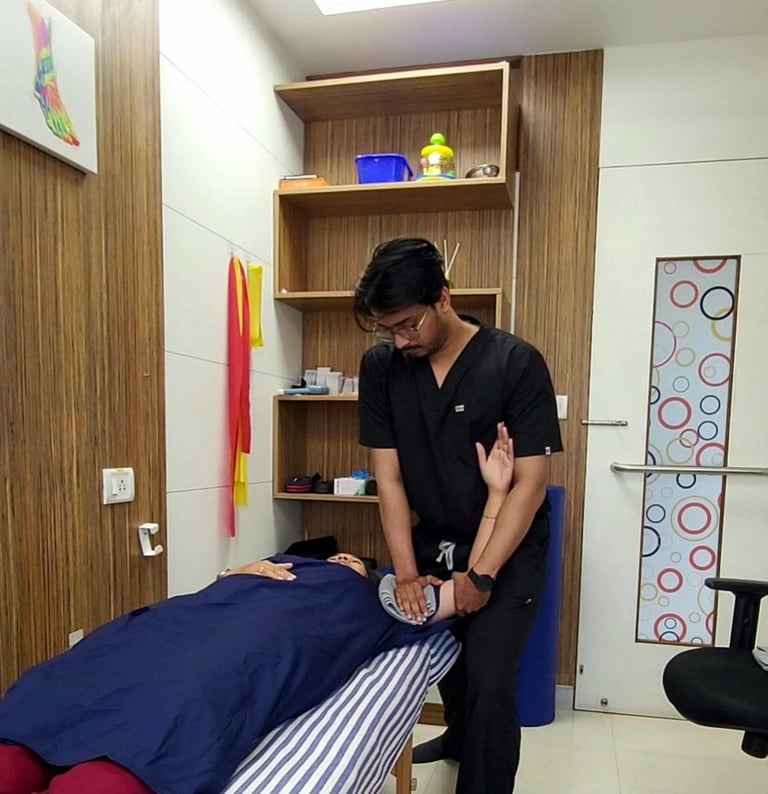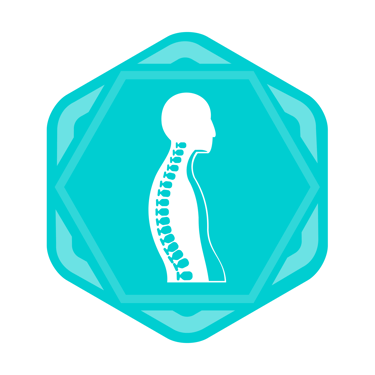The Frozen Shoulder Fix: Combining Medical Expertise with Natural Healing
Learn how to alleviate frozen shoulder pain and stiffness with our comprehensive guide, covering natural remedies, exercises, physiotherapy, and medical interventions.
Nhehern Acharya (MPT)
5/22/20244 min read


Frozen Shoulder - Lets Talk FAQs
Frozen Shoulder Contracture Syndrome (FSCS), more famously known as adhesive capsulitis or Frozen shoulder, is a condition characterized by stiffness and pain in the shoulder joint. It can significantly impact daily life, making even simple tasks like combing your hair a challenge.
What is Frozen Shoulder?
How to Unfreeze a Frozen Shoulder?
When dealing with a frozen shoulder, it's essential to focus on gentle stretching and range-of-motion exercises. These exercises can help improve flexibility and reduce stiffness over time. Physiotherapy is often recommended to help mobilize the shoulder, guide individuals through exercises, and ensure they are done correctly. Here, a physiotherapist can design a personalized exercise program tailored to the individual's specific needs and limitations. It's like having a personal trainer for your shoulder!
Is Heat Good for Frozen Shoulder?
When it comes to frozen shoulder, heat is your friend. It helps increase blood flow to the area, promoting healing and easing stiffness. Whether it's a warm compress or a soothing shower, heat therapy can be like a cozy blanket for your shoulder, helping relax the muscles and alleviate discomfort associated with frozen shoulder.
How to Fix a Frozen Shoulder Naturally?
Typically, frozen shoulder improves spontaneously without treatment over 2- 3 years. However, some individuals may, in fact, never fully regain their previous range of motion. There are quite a few treatment options for frozen shoulder, and they are often given as a concoction. But no obvious course of action that suits everyone exists, hence the treatment has to always be tailored to the individuals needs.
Is Massage Good for Frozen Shoulder?
Massage therapy can be a helpful adjunct to traditional treatments for frozen shoulder. It can help relax tight muscles, improve circulation, and reduce pain and stiffness in the shoulder joint. However, it's essential to consult with a healthcare provider or a qualified massage therapist before undergoing any massage therapy for a frozen shoulder.
What is the Best Remedy for Frozen Shoulder?
The best remedy for frozen shoulder often involves a combination of treatments tailored to the individual's specific needs. This may include a mix of physical therapy, gentle exercises, heat therapy, massage, and in some cases, anti-inflammatory medications or corticosteroid injections. Working closely with healthcare professionals to develop a comprehensive treatment plan is key to effectively managing and resolving frozen shoulder.
Does Frozen Shoulder Need Physiotherapy?
While Frozen shoulder is considered a self-limiting condition, meaning it will typically improve over time, therapy is often required to help manage symptoms, facilitate recovery, and reduce the risk of long-term complications.
Here are some keyways in which physical therapy proves effective in addressing frozen shoulder:
1. Tailored Exercise Programs:
We create custom workout plans for each person, honing in on what your shoulder needs most. These exercises are all about loosening up tight spots and building up strength and shoulder mechanics.
2. Manual Therapy Techniques:
We use hands-on methods like gently mobilizing your joints and employing soft tissue mobilization techniques to help loosen things up. This can make your shoulder feel less stiff and less painful; thus enhancing the effectiveness of exercise programs and help you exercise better.
3. Patient Education:
It's important to understand what's up with your shoulder to take care of it right. Therapists educate you about frozen shoulder, how it changes over time, and why sticking to your exercises is a big deal for keeping your shoulder in good shape. This helps you take charge of getting better.
4. Modalities for Pain Management:
Modalities may be incorporated to alleviate pain. These adjunctive therapies complement the rehab plan's exercise and manual therapy components.
5. Gradual Progression:
Physical therapists make sure your exercises go up gradually, changing things based on how you're doing. This way, avoiding setbacks while getting better.
Can a frozen shoulder come back?
The management of frozen shoulder requires a multifaceted approach that incorporates a range of strategies to address the physical, emotional, and social aspects of this condition. By understanding the complexities of frozen shoulder and the various ways it can impact daily life, individuals can better navigate the challenges it presents. From gentle exercises and heat therapy to massage and physiotherapy, there are numerous avenues to explore in the pursuit of relief and recovery. Consistency and patience are key as it may take several weeks or months of regular exercises and therapy to regain full mobility. It is crucial to work closely with healthcare professionals to develop a personalized treatment plan that acknowledges the unique needs and limitations of each individual. By doing so, individuals can regain mobility, alleviate pain, and improve their overall quality of life.
Keywords: shoulder pain, adhesive capsulitis, range-of-motion exercises, physiotherapy, heat therapy, natural remedies, massage therapy, stiffness, flexibility, mobility, anti-inflammatory medications, corticosteroid injections, pendulum swings, passive stretching, wall climbing, crossover arm stretch, blood flow, muscle relaxation, personalized treatment plan, recovery process.
Conclusion
A frozen shoulder can potentially come back after treatment, although the likelihood of recurrence varies depending on the individual and the treatment approach used. However, as much as we've learned, there's still so much more research needed to fully understand all the risk factors and long-term prognosis for the recurrence of this pesky frozen shoulder condition. It's like a puzzle we're still trying to solve, but with each new study, we're getting closer to having all the pieces in place.
What is the cause of a frozen shoulder?
While the exact underlying cause of this condition is not definitively understood, factors such as diabetes, postoperative fractures resulting in limited shoulder movement, certain diseases, and injuries to surrounding muscles are known to trigger the occurrence of frozen shoulder. Additionally, biomechanically, capsular tightness has been identified as a significant factor contributing to the development of frozen shoulder


WORKING HOURS
Monday - Saturday 8:00 AM - 8:00 PM
Sunday 9:00 AM - 5:00 PM
ADDRESS
Kairos Physio, F3 First floor, near Basillios Gym, St. Inez Rd., St. Inez, Panjim- Goa 403001.
CONTACT
+91 7259527374
kairosphysio@gmail.com
